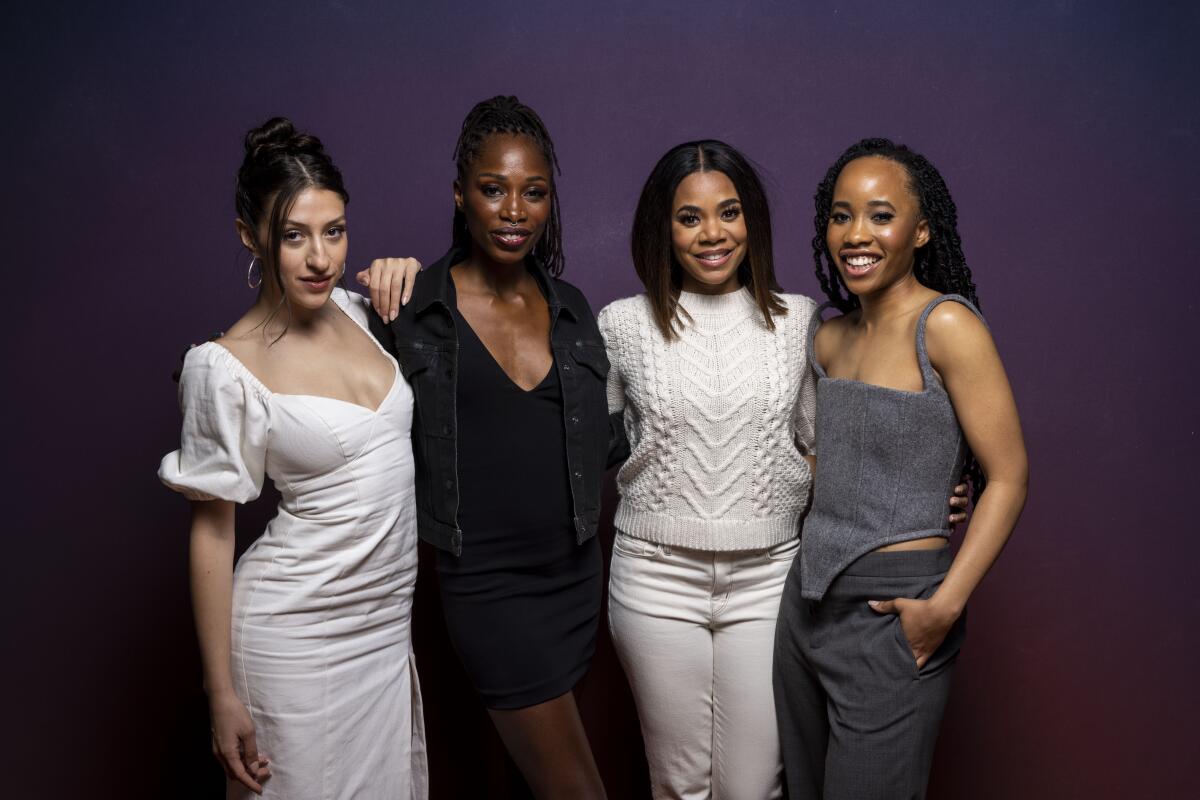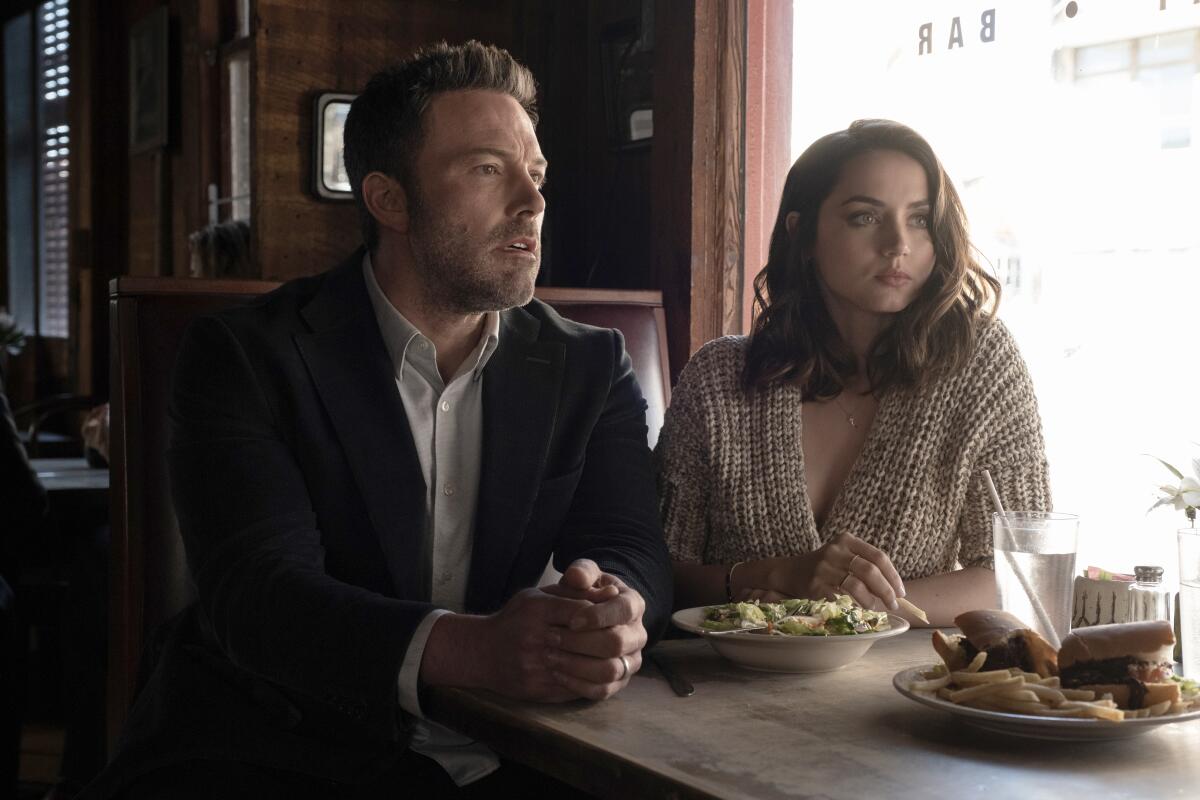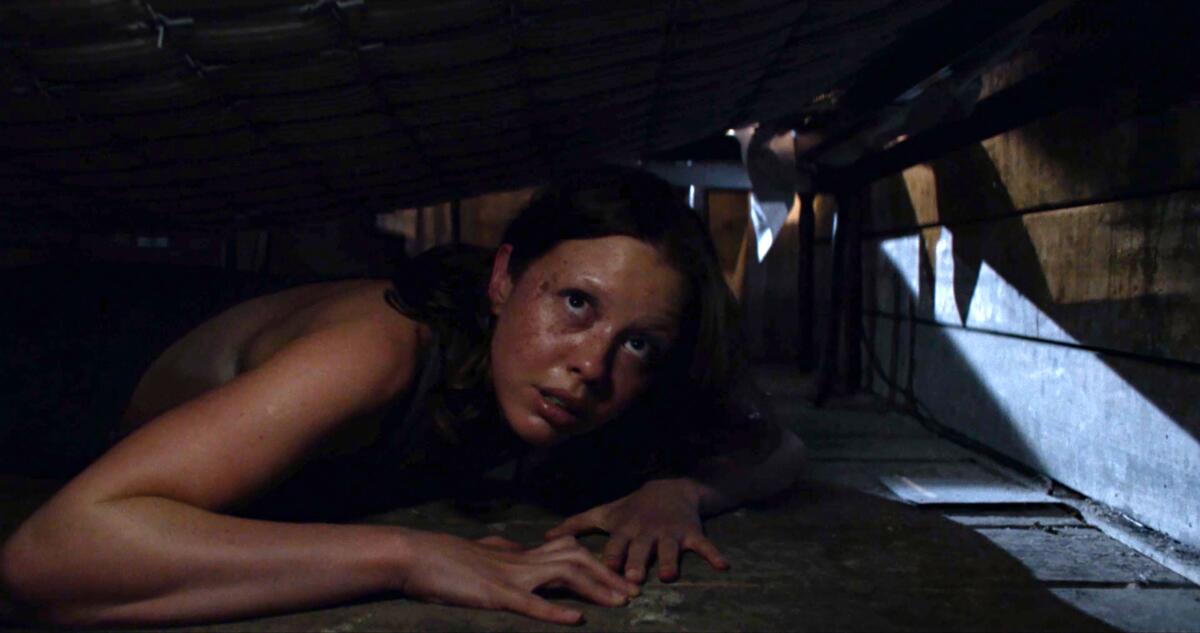Ghosts of the past haunt ‘Master’
Hello! I’m Mark Olsen. Welcome to another edition of your regular field guide to a world of Only Good Movies.
Only good movies
Get the Indie Focus newsletter, Mark Olsen's weekly guide to the world of cinema.
You may occasionally receive promotional content from the Los Angeles Times.
Ryan Faughnder has been covering the fallout from Disney CEO Bob Chapek’s bungled response to what has become known as Florida’s “Don’t Say Gay” bill, taking note of “the Disney chief’s urgent task of repairing trust with the employees who said they were ‘disappointed, hurt, afraid, and angry’ over the company’s refusal to condemn the legislation before it was passed by the state Legislature.”
Tracy Brown wrote personally and powerfully about what this all means and why it matters for those who have come of age as fans of Disney’s stories and characters.
“After all, stories help us figure out the world, who we are and even who we want to be. For many people who grew up on Disney films, both the stories and the memories around watching those stories played at least some part in shaping who we eventually became,” Tracy wrote.
“But representation alone, no matter how significant, is just not enough at a time when numerous states are advancing a record amount of anti-LGBTQ legislation. … Entertainment companies have said time and again how much they value diversity and aim to advocate for a more inclusive future. Maybe one day they’ll prove it.”
The Academy Awards are nearly here, at last, and this week Josh Rottenberg spoke to Will Packer, producer of this year’s show. Packer was in no way backing down from controversial decisions to present eight awards before the live broadcast begins and to recognize a “fan favorite” title.
“The theme of the show is ‘Movie Lovers Unite,’ and by that, I mean movie lovers of all stripes,” said Packer. “Some are movie lovers who have seen every single one of the nominated movies, and they’ve got very specific opinions about who wins. And then you have people who are just casual moviegoers, who perhaps have not seen the awards fare but who also love movies. I’m inviting them in as well. They’re just as important to me as a viewer. And I think we can have a show that does both. We can walk and chew gum at the same time.”
In other news, I survived my first in-person film festival since January 2020, having traveled to Austin, Texas, for the South by Southwest Film Festival. There were plenty of high-profile movies, such as “Everything Everywhere All at Once” with Michelle Yeoh and Jamie Lee Curtis, “The Lost City” with Sandra Bullock and Daniel Radcliffe, and “The Unbearable Weight of Massive Talent” with Nicolas Cage and Pedro Pascal.
But the festival had plenty more to offer as well, including Halina Reijn’s “Bodies Bodies Bodies,” Jeff Baena’s “Spin Me Round” and Eli Horowitz’s “The Cow,” as well as Beth de Araújo’s “Soft & Quiet,” Morrisa Maltz’s “The Unknown Country” and Vasilisa Kuzmina’s “Nika.”
Photographer Jay L. Clendenin was at SXSW as well for a portrait studio, along with videographer Mark Potts, who continued his series on “Very Important Questions.”
The Academy Museum is presenting a “Weekend With Jill Sprecher” on Friday and Saturday, screening the filmmaker’s essential ’90s indie, “Clockwatchers,” along with her “Thirteen Conversations About One Thing” and her selection of Stanley Kubrick’s “The Killing.” Sprecher will be at a Q&A for “Clockwatchers” along with actor Alanna Ubach, an event moderated by actor and comedian John Early, and will introduce the other two screenings.
Canadian filmmaker Patricia Rozema will be at a screening on Friday night of a new restoration of her 1987 film, “I’ve Heard the Mermaids Singing” at the Alamo Drafthouse L.A.
The American Cinematheque will screen the new restoration of Tsai Ming-liang’s 2003 film, “Goodbye, Dragon Inn,” about the final show at a Taipei movie theater, on two upcoming Sundays, March 20 and 27.
Enjoying this newsletter? Consider subscribing to the Los Angeles Times
Your support helps us deliver the news that matters most. Become a subscriber.
‘Master’
Written and directed by Mariama Diallo, “Master” takes place at a fictional Northeastern college beset by the ghosts of its racist past in multiple ways. While teachers Gail and Liv (Regina Hall, Amber Gray) are confronting the institution’s systemic racism, freshman student Jasmine (Zoe Renee) has been assigned a dorm room said to be possessed by an evil spirit. The film is in limited theatrical release and streaming on Amazon Prime Video.
For The Times, Jessica Kiang wrote, “As if the film itself were unconvinced by its horror-movie trappings, the last third is almost entirely devoid of supernatural elements. Instead, it focuses on late-breaking colorism and passing issues, on racial tokenism in academia and the limits of one individual’s power to effect institutional change. These are interesting and knotty topics, treated intelligently and with insight, and along with a subplot about a potential rape and myriad other motifs that go nowhere, they warrant more than the cursory screen time they get here. … And so ‘Master’ ends up a genre film in which the outlandish generic elements — the witches and the maggots, the fizzing bulbs and out-of-sync shadows — are far less frightening than its portrayal of this real, everyday world in which racism isn’t a long-dead bogeyman; it’s alive, breathing, banal.”
Sonaiya Kelley spoke to Diallo and Hall about the making of the film for a story publishing soon. Diallo, who attended Yale, acknowledged that the story had its roots in her experiences there. “Making this film and even just to talk about it now is this evolving process of learning more about myself,” she added. “On the most micro, textual level, my experience was really similar to Jasmine’s: The world that she’s living in and some of the darts that are constantly thrown at her are things that I experienced as an undergraduate as well. But I think that what I did, which we see Jasmine try to do, is turn down the noise of that level of racism because it would’ve been impossible to finish had I allowed myself to feel everything that was coming toward me. I made a kind of shield that I realize still exists around me in part to this day. So I really just needed to go back through my history and to excavate all of those memories.”
For the New York Times, Lisa Kennedy wrote, “The lives of three Black women entwine like ivy in ‘Master,’ a horror movie with a psychological bent set on the campus of Ancaster, a fictional college in New England. What befalls them may offer a cautionary lesson on racial microaggressions: Get thee to a historically Black college! But what proves most promising in this debut feature from the writer-director Mariama Diallo is the eerie, potent space she creates and holds for her leads to tease the nuances and twists of being a successful Black woman (there are no Black men here) in a racially vexed institution.”
For the New Yorker, Richard Brody wrote that this film “is a passionate and melancholy fantasy that employs supernatural elements for a bracingly realistic view of college life and American institutions. … Diallo avoids satirical exaggeration, telling the story with earnest intensity and filming it with an insistently still camera, which plays like eyes that are forced open to acknowledge long-suppressed horrors.”

‘Deep Water’
Directed by Adrian Lyne, master of the high-style erotic thriller, “Deep Water” — his first feature in 20 years — is an adaptation of a novel by Patricia Highsmith. In the film, Vic (Ben Affleck) and Melinda (Ana de Armas) have a marital dynamic that may or may not be working for them, where she flaunts her affairs with other men and he seems not to mind. That is until he tells her latest lover that he killed the last one. And he may or may not be joking. “Deep Water” is streaming on Hulu.
For The Times, Justin Chang wrote, “As shot by Eigil Bryld, this ‘Deep Water’ is almost reassuringly shallow, a catalog of Architectural Digest furnishings and tasteful female nudity (wayward wife, meet antique bathtub). The slick sheen that has long clung to Lyne’s images, since his days as a director of TV commercials, hasn’t abandoned him over the last two decades. Nor has he lost the interplay of seriousness and silliness — and the genial refusal to distinguish between the two — that has long animated his work. … It’s possible, while streaming ‘Deep Water,’ to feel a stab of nostalgia for the big-screen heyday of the Hollywood erotic thriller, a genre to which Lyne and several others — the Lawrence Kasdan of ‘Body Heat’ and the Paul Verhoeven of ‘Basic Instinct’ among them — made indelibly sweaty contributions in the ’80s and ’90s. But the resemblance between Lyne’s latest and those earlier lurid entertainments turns out to be superficial at best.”
For the Wall Street Journal, Amy Nicholson wrote, “‘Deep Water’ is a wickedly funny potboiler about sex, gossip and hypocrisy that Mr. Lyne has transplanted from the suburban Northeast to New Orleans, a city that sweats menace despite the film’s chilly blue cinematography and coldly erotic score. The filmmaker is ecstatic to put sex back into cinemas — or, at least, stream it on Hulu. Can Mr. Lyne once more make titillation mainstream when a generation of actors has gotten used to hiding their hormones under superhero codpieces? … The satire under the surface of ‘Deep Water’ is that the Van Allens’ friends prefer to rally behind a killer over a cheater. So what if Vic may have slain a man — how dare his wife embarrass him with that piano player? The town’s morally askew loyalty to a suspected murderer literalizes that stereotype about the battle of the sexes: that men win arguments by keeping their voice calm, frustrating women into sounding comparatively unhinged.”
For Vulture, Alison Willmore wrote, “‘Deep Water’ is billed as a thriller, but it builds up little urgency because its stakes are never clear. … For all its sloppiness, though, ‘Deep Water’ offers the rare-these-days experience of watching a movie that feels decidedly grown-up. It may be set in a subtropical city, but there’s a coolness to its look, to the slightly green-tinged cinematography and the unwilted crispness of its characters’ appearances, that adds a sense of distance. When Vic and Melinda get ready to go to that first party, Melinda allows Vic to pick the shoes she’s going to wear and to kneel and put them on her feet. Then they disappear into the night in a flurry of perfume and promises to the babysitter, off to the unfathomable land of adults, a place so vividly realized that you can almost believe the messiness of the film’s writing passes for psychological complexity.”
For Tribune News Service, Katie Walsh wrote,”‘Deep Water’ is ridiculous and trashy, but in that ‘Saturday night, bottle of wine, bowl of popcorn on the couch’ kind of way. But this isn’t an easily digestible pablum either. The ending of the film is far more ambiguous than the novel’s conclusion. Is it an endorsement? That’s up to the viewer, but it’s a lot more complex and chewy than most movies offer up these days, so it’s worth a dip into ‘Deep Water.’”

‘X’
Written and directed by Ti West, “X” is a delightfully lurid horror film about a group of 1970s Texans, played by Mia Goth, Jenna Ortega, Martin Henderson, Brittany Snow, Owen Campbell and Scott Mescudi, who go to a remote farm to make an amateur porn film but find that the elderly couple who own the property have plans of their own. The film is in theaters now.
For The Times, Robert Abele wrote, “West may want your suspense held as much through the emotional grounding of his hapless and not-so-innocent characters as through his masterful technique, and on that front, Goth does a fine job embodying West’s themes of female agency and denied passion. But chances are you’ll be way more preoccupied by the genre lures: that alligator introduced so terrifyingly early on, wondering when that small ax is going to get used, or what’s in the old couple’s basement. It would be a mistake to call ‘X’ a misfire — in its artisanal, period textures and delight in old-school atmospherics, it’s too well made. But it’s better at teasing than following through.”
Jen Yamato tells how West has already shot a prequel to the film for distributor A24, co-written with Goth. “It was really just betting on, ‘Well, if we write a good script, why would they say no?’” said West. “We joked that the most A24 thing we could do with this movie is make two of them. For a studio that is consistently making challenging, progressively interesting, filmmaker-driven [projects], making two movies at the same time fell into the umbrella of what’s so cool about what they’re doing.”
For the New York Times, A.O. Scott wrote, “‘X’ is a clever and exuberant throwback to a less innocent time, when movies could be naughty, disreputable and idiosyncratic. Two kinds of movie in particular: the dirty kind and the scary kind. Set in 1979, before the internet made pornography ubiquitous and before anyone was pontificating about ‘elevated horror,’ this sly and nasty picture insists that the flesh and blood of down-and-dirty entertainment is, literally, flesh and blood. … [West] is both a canny craftsman and a genre intellectual. In the midst of the sex and slaughter, he conducts an advanced seminar on visual pleasure and narrative cinema.”

Only good movies
Get the Indie Focus newsletter, Mark Olsen's weekly guide to the world of cinema.
You may occasionally receive promotional content from the Los Angeles Times.




